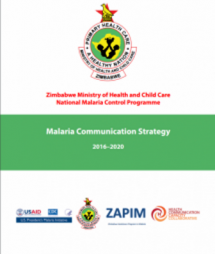Zimbabwe National Malaria Communication Strategy
Zimbabwe’s Malaria Communication Strategy (MCS) has been developed to support the National Malaria Strategic Plan (NMSP), which in turn serves to accomplish goals of the National Health Strategy for the same period, 2016-2020. A participatory consultative process was conducted to review a wide range of documents including the 2016 Malaria Indicator Survey (MIS), Malaria Programme Review (MPR), Zimbabwe Demographic Health Survey (ZDHS), Multiple Indicator Cluster Survey (MICS), Tracking Results Continuously (TRaC) Survey, previous qualitative and quantitative surveys and programme reports to review past and current social and behaviour change communication (SBCC) progress in malaria.
Several key findings include high rates of indoor residual spraying (IRS) acceptance and an increasing rate of care seeking behavior for fever. Findings also include low uptake and utilization of long-lasting insecticide-treated nets (LLINs), low malaria risk perception, low prompt care seeking among caregivers of children under five, and low uptake of intermittent preventive treatment for pregnant women (intermittent preventive treatment in pregnancy – IPTp). Changes in malaria epidemiology necessitated re-stratifying the country into five distinct transmission zones which are: free/ sporadic; low and short seasonal; moderate and seasonal; high and seasonal; and high and perennial. Participants present for this consultation recognized the need to tailor different SBCC approaches for these transmission zones. This MCS describes changes in communication objectives between control areas (high and moderate transmission) and pre-elimination areas (low and unstable transmission).
Source: Johns Hopkins University Center for Communication Programs
Date of Publication: March 25, 2019
SIMILIAR RESOURCES
Tools
Examples
- Community Communication MNCH e-Manual: Participatory Health Promotion Sessions
- Prevent, Detect, Respond: How Community Health Workers can Help in the Fight against COVID-19
- Transforming the Private Sector to Support Universal Malaria Diagnostic Coverage
- Promoting Quality Malaria Medicines Through SBCC: An Implementation Kit
- Advocating for Change for Adolescents’ Toolkit
- Reaching First-Time Parents and Young Married Women for Healthy Timing and Spacing of Pregnancies in Burkina Faso
- Generic Algorithm to Aid Action Planning at District and Regional Levels
- Senegal Malaria Communication Strategy 2016-2020
- PrEP Communications Accelerator
- Gender and Malaria Fact Sheet

